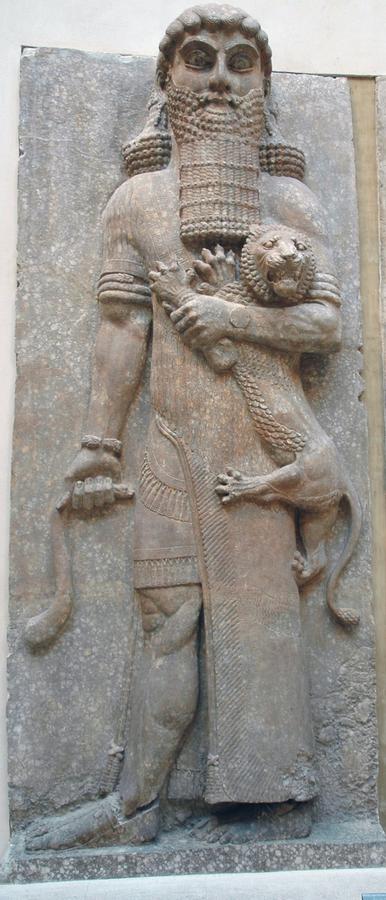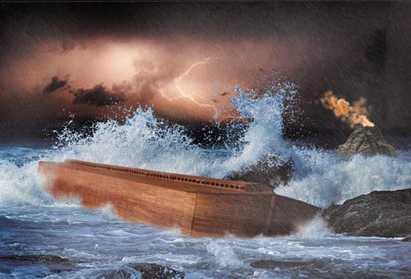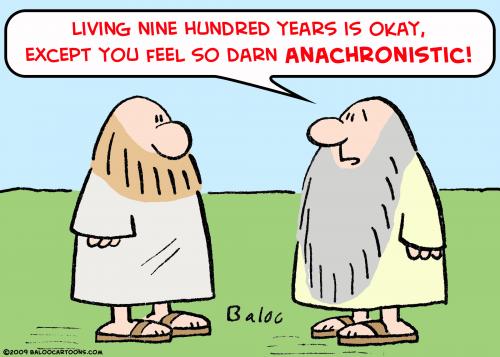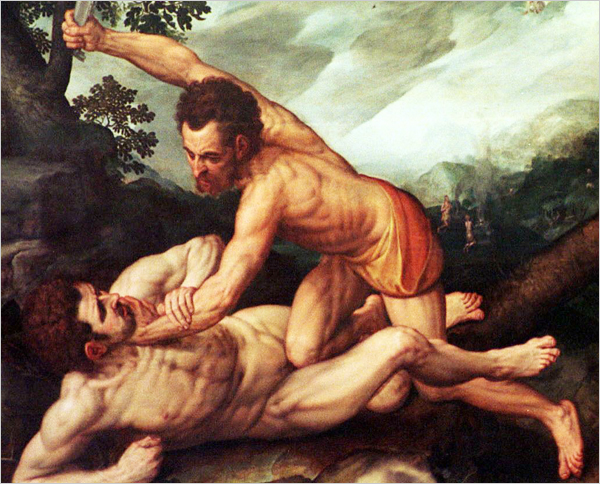What it literally says - The sons and clans from Japheth, Ham and Shem are listed.
What it says to me - It is a short chapter today. From Noah's three sons come the rest of humanity as we know it today. I read through the chapter recognizing some names and sects but having most fly over my head. I guess sections like these are more for historical records, but God's gotta be using them for something else ... maybe not. We all like to think that He does mighty things out of unsubstantial ones (which He does), but couldn't He also do smaller things, too, that eventually lead to something mighty from something unsubstantial? It's easier to see this in hindsight situations, how making this choice led to that happening which paved the way for this to occur so that this could change someone's life. God certainly can work in stages to get to something bigger; He didn't come to Earth as Jesus right after the flood, did He?
Haha, but now that I've written the above I've done some more research and there is much more to this chapter than meets the Westernized eye.
In the middle of the chapter are a few sentences that don't seem to match up to the whole, and whenever that happens you know it's there for an attention grabbing purpose (coincidentally, that's also a way to read into Shakespeare's iambic pentameter). Smack dab after the role-call listing of Ham's great-grandsons is a paragraph that brings us back two generations to Ham's son Cush and let me tell you ... I found something interesting.
 The name of one of Cush's sons might stand out a bit if you like to call people names or enjoy Green Day's music: Nimrod. Nimrod receives a bit of special attention here instead of just a nod. We learn beginning in verse 8 that he "grew to be a mighty warrior on the earth. 9 He was a mighty hunter before the LORD; that is why it is said, 'Like Nimrod, a mighty hunter before the LORD.'" How do you interpret these verses? Initially, it sounds like Nimrod was the complete opposite of how we use his name today. An awesome warrior of world renown who founded a kingdom (10)! I mean, why else would he have a little longer write-up than anyone else? And he did it "before the LORD" meaning God blessed him and guided him and led him into power, right?
The name of one of Cush's sons might stand out a bit if you like to call people names or enjoy Green Day's music: Nimrod. Nimrod receives a bit of special attention here instead of just a nod. We learn beginning in verse 8 that he "grew to be a mighty warrior on the earth. 9 He was a mighty hunter before the LORD; that is why it is said, 'Like Nimrod, a mighty hunter before the LORD.'" How do you interpret these verses? Initially, it sounds like Nimrod was the complete opposite of how we use his name today. An awesome warrior of world renown who founded a kingdom (10)! I mean, why else would he have a little longer write-up than anyone else? And he did it "before the LORD" meaning God blessed him and guided him and led him into power, right?Wrong.
Very wrong.
Our English translations do as best as their translators can, uh, translate, but the old saying is true; so much is lost in translation. If you look up the Hebrew word for "before" in the phrase "before the LORD," here is what you get: פָּנִים, which is transliterated as paniym. Paniym roughly means "face," "faces," "in front of," or "in the face of." It is also used to mean "against." Nimrod wasn't a mighty hunter for the LORD, he was a mighty hunter facing the LORD ... in the face of the LORD ... against the LORD.
I had a holy crap moment when I began looking into who the heck Nimrod was. Not everyone in the Bible is a good guy, obviously, but it's so interesting how Nimrod is treated, especially if we perceive the Word as a historical document. He's mentioned in a different way to bring attention to his notoriety, but then his exploits aren't written in detail except for which kingdoms he began. And look at what he built! Babylon and Nineveh. Well, of course, I failed to look up his name first, which really should be the go-to move when looking up someone in the Bible. Names are always chosen carefully, or their meanings are usually directly related to their owner's actions. What does "Nimrod" mean then? "Rebel."
Now the pieces are beginning to fall into place ... and it doesn't stop here!
A quick Google search of "nimrod genesis" yields a primary source from christiananswers.net entitled, "Nimrod. Who Was He? Was He Godly or Evil?" To sum up, Nimrod is Gilgamesh from the ancient Mesopotamian epic poem. I never read it in school (we read Beowulf instead), but look at these similarities between Nimrod and his poetic counterpart, Gilgamesh:
- The Bible calls Nimrod a tyrant, and Gilgamesh was a tyrant.
- There was a flood in the Bible; there is a flood in the Epic.
- Cush is mentioned in the Bible, Kish in the Epic.
- Erech is mentioned in Scripture; Uruk was Gilgamesh's city.
- Gilgamesh made a trip to see the survivor of the Flood. This was more likely Ham than Noah, since “Nimrod” was Ham's grandson.
- Historically, Gilgamesh was of the first dynasty of Uruk. As Jacobsen points out (1939: 157), kings before Gilgamesh may be fictional, but not likely. The fact that the Gilgamesh epic also contains the Deluge story would indicate a close link with events immediately following the Flood.
I think the article makes a lot of sense and provides a persuasive argument.
Nimrod was definitely not a nice guy, a tyrant who turned people away from God. Remember that he built Babylon? The Tower of Babel is infamous for God confusing the people by making them speak different languages (which we'll get to in the next chapter!). Now that we know Nimrod founded the empire and was rebellious towards God (and his followers were probably the same), it makes more sense that God would give them some kind of comeuppance.
I'm certainly going to think twice before I call someone a Nimrod. To be honest, I've probably never called anyone that before. But now if I do, to be more PC I'll make sure that the person receiving such an epithet will at least be in rebellion against God, building a giant tower, or have a long epic poem written in honor of him by ancient Mesopotamians.











